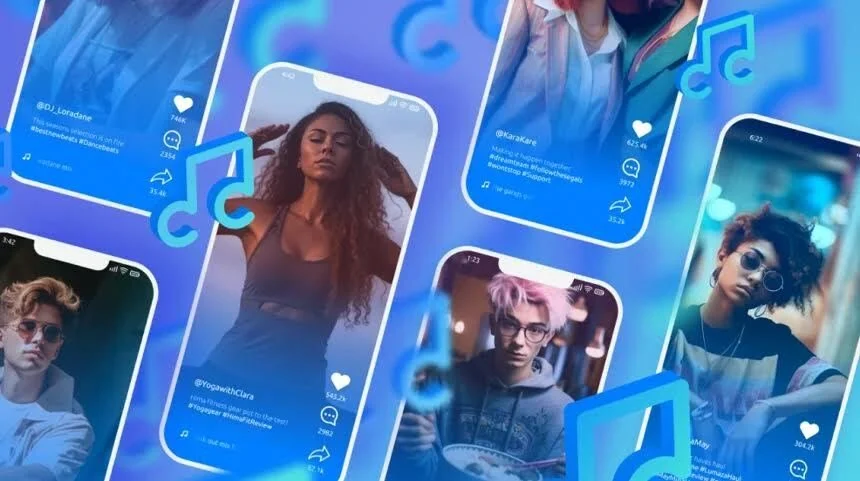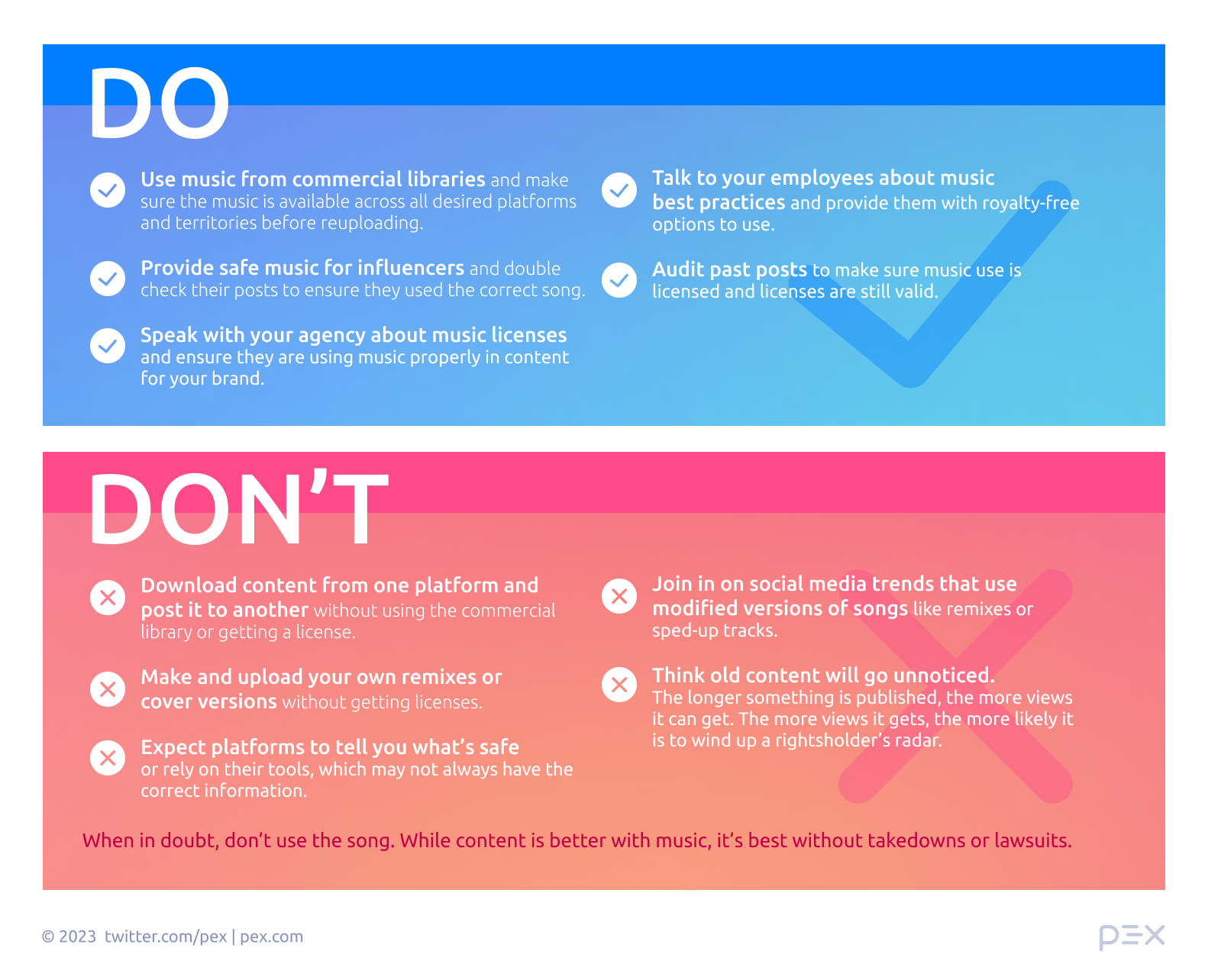When Viral Tracks Become Legal Traps for Brands: Why It’s Time to Rethink Music Use on Social Media
Music has become synonymous with the social media experience. It drives trends, fuels engagement, and adds personality to short-form video content, which makes up the bulk of today’s feeds. Whether you are scrolling TikTok, Instagram Reels, or YouTube Shorts, chances are the video you are watching is paired with a song. In fact, 85% of videos on TikTok, 84% of videos on YouTube, 58% on Instagram, and 49% on Facebook contain at least 10 seconds of music.
For everyday users, this isn’t much of an issue. Adding a trending song to a Reel or TikTok is quick, easy, and often encouraged by the platforms themselves. But for brands, it’s a different story. Using copyrighted music in content with a license —whether in your own posts or posts by creators on your behalf—can lead to serious consequences. And as marketing continues to shift toward social-first and creator-led strategies, record labels and rights holders are paying closer attention than ever.
Recent Lawsuits Show the Real Risk
High-profile cases illustrate just how serious this issue has become:
Designer Shoe Warehouse (DSW) was sued by Sony Music and Warner Music for allegedly using over 200 popular songs in TikTok and Instagram campaigns, including influencer partnerships. Damages could exceed $30 million.
Crumbl Cookies faces a lawsuit from Warner Music Group for nearly 300 instances of unlicensed use of tracks from artists like Taylor Swift, Beyoncé, and Lizzo, with claims reaching $24 million.
Marriott was previously sued by Sony Music for hundreds of social media ads using copyrighted songs. The lawsuit was eventually dismissed, but damages could have reached $130 million.
USC was taken to court by Sony Music for $42 million after allegedly using over 1,670 songs in 250 videos without permission.
These are just the public cases. Many more brands receive cease-and-desist letters or settle out of court, keeping the true scale of the problem largely hidden.
Why Brands Keep Getting It Wrong
A major reason is misunderstanding how copyright works on social media. Licensing for traditional media like TV, film, and commercials is relatively straightforward. Social media, by contrast, is complex. Platforms negotiate licensing deals with labels and rights holders to offer pre-cleared songs—typically for personal use only.
Some brands assume that if a song is available on a platform, they automatically have permission to use it commercially. This couldn’t be further from the truth. The moment content promotes a product or service, whether in organic posts, ads, or influencer campaigns, it is considered commercial use and requires separate licensing.
Licensing agreements are also platform-specific and often inconsistent. A track cleared for commercial usage on TikTok may not be cleared for Instagram. What’s available on YouTube might not be available on Facebook. Even commercial-approved libraries are not foolproof—rights can expire without notice, turning previously compliant posts into violations overnight.
The challenge is amplified by the speed of social media trends. Licensing a song to jump on a trend can take weeks and cost thousands or even hundreds of thousands of dollars. By the time legal clears it, the moment is gone. Brands expected to move at the speed of culture might feel pressured to act fast and “ask for forgiveness later,” or not consider the legal and financial ramifications of doing so.
How the Risk Multiplies: Creators, Employees, and Reposts
Working with creators and influencers adds another layer of complexity. Creators often use trending music in their organic content to boost engagement, increase reach, and participate in trends. But when content is sponsored, it is considered commercial, meaning creators cannot use copyrighted music without permission. That’s something that can be overlooked by both creators and brands.
Employee advocacy programs create additional risk. Encouraging employees to post behind-the-scenes, day-in-the-life, or company updates can turn staff into copyright liabilities. A social media video set to a popular song by an employee might drive conversation, but legally, it is still an infringement risk.
Even reposting content can create problems. Instagram and TikTok’s Collabs and Repost tools make it easy to amplify and reshare creator or user-generated content, but if that content contains copyrighted music, resharing it can expose brands to liability—even if the original post was not created or published by the brand.
The Hidden Dangers of Enforcement
Rights holders don’t always act immediately, which can create a false sense of security. Brands might post unlicensed music multiple times without issue, thinking they are in the clear. Behind the scenes, rights holders track violations and can enforce them months or even years later.
The costs go beyond legal damages. Unlicensed music can force brands to remove content or pull it from creator partners, disrupting campaigns and relationships. That top-performing post that finally cracked the algorithm? It can vanish overnight, along with all its reach and engagement. Reputational damage from copyright violations can be even costlier, particularly for brands seeking to be seen as creator-friendly—and yes, that includes respecting artists’ rights—and ethical.
Building Your Defense: Steps Brands Can Take
To avoid these pitfalls, brands need to be proactive about how they approach music in their content. That starts with strong internal processes and best practices:
Audit Regularly: Review all published content, including creator posts, to identify potential music rights violations. Continuously check that licenses remain valid, as platform-specific restrictions can change.
Establish Clear Guidelines: Provide guidance for internal teams, employees, and external partners on using music in content. Educate your ecosystem on the difference between personal and commercial use and the process for securing licenses.
Implement Approval Workflows: Every piece of social content—including reposts and creator posts—should be reviewed for cleared music rights before going live.
Provide Pre-Cleared Options: Include approved music in campaign briefs and maintain a database of licensed tracks.
When in Doubt, Don’t Use It: While music can enhance engagement, it is rarely worth a takedown or lawsuit.
How Technology Makes Compliance Manageable
Managing multiple accounts, influencers, and platforms manually can be overwhelming. Music identification technology makes compliance scalable with audits, monitoring, and alerts. Pex helps brands detect and manage commercial music use across social media, employee posts, and influencer programs with its music monitoring solution for brands
With Pex music monitoring, brands can:
Audit Published Posts Across All Accounts – Identify music in published content and influencer promotions, and verify only commercially licensed music is being used.
Monitor and Protect in Real Time – Scan employee and influencer content before it goes live and stop risky posts from causing takedowns or delays.
Quickly Edit Content for Compliance – Quickly mute or replace audio, or remove posts with unlicensed music, to reduce risk and keep content live safely.
By combining strong internal processes with the right technology, brands can safely leverage music in social and influencer marketing campaigns while protecting themselves legally. Proper music rights management helps prevent not only costly multi-million-dollar copyright infringement lawsuits but also interruptions to campaigns and damage to brand reputation.
Get a Free Copyright Check from Pex
Share your Instagram or TikTok handle and Pex will audit your account to identify the total amount of music used. Sign up here for free to understand your current risk.
Want more creator economy news, trends, and insights? Sign up for my newsletter and follow me on LinkedIn, Threads, and Instagram.



